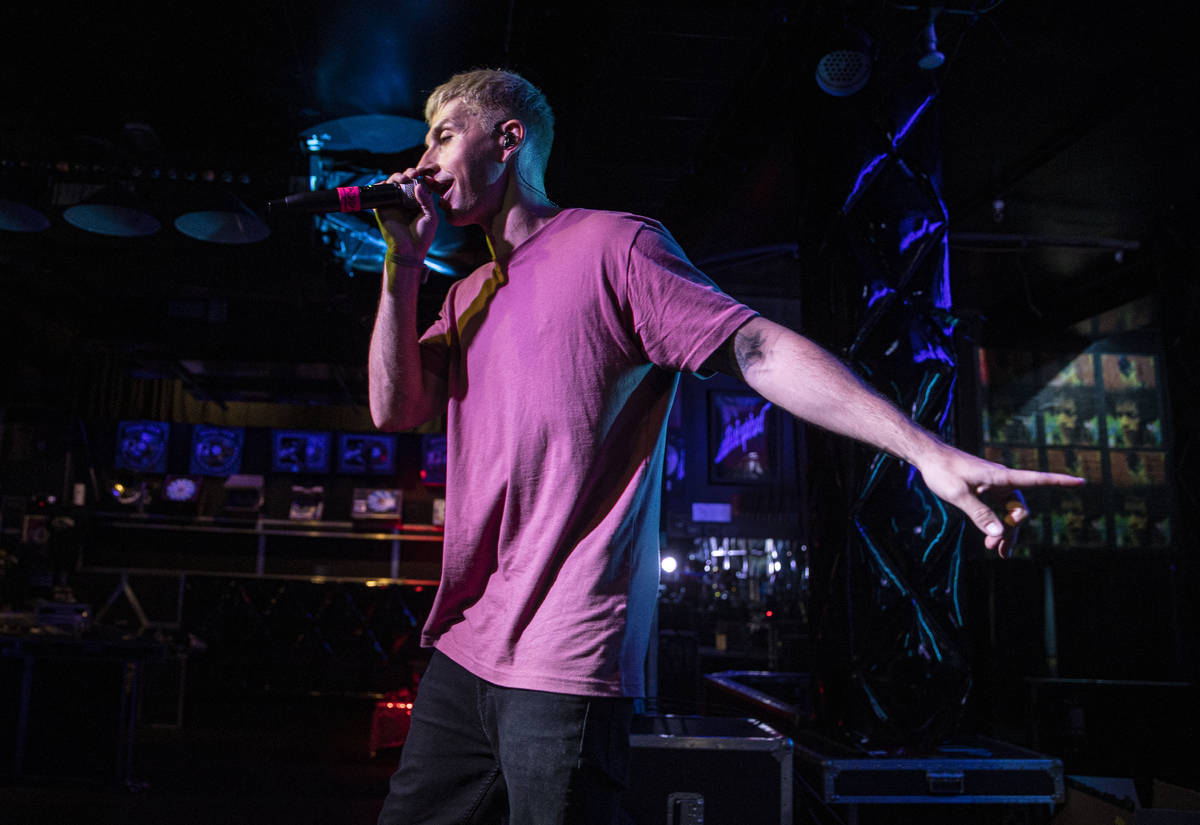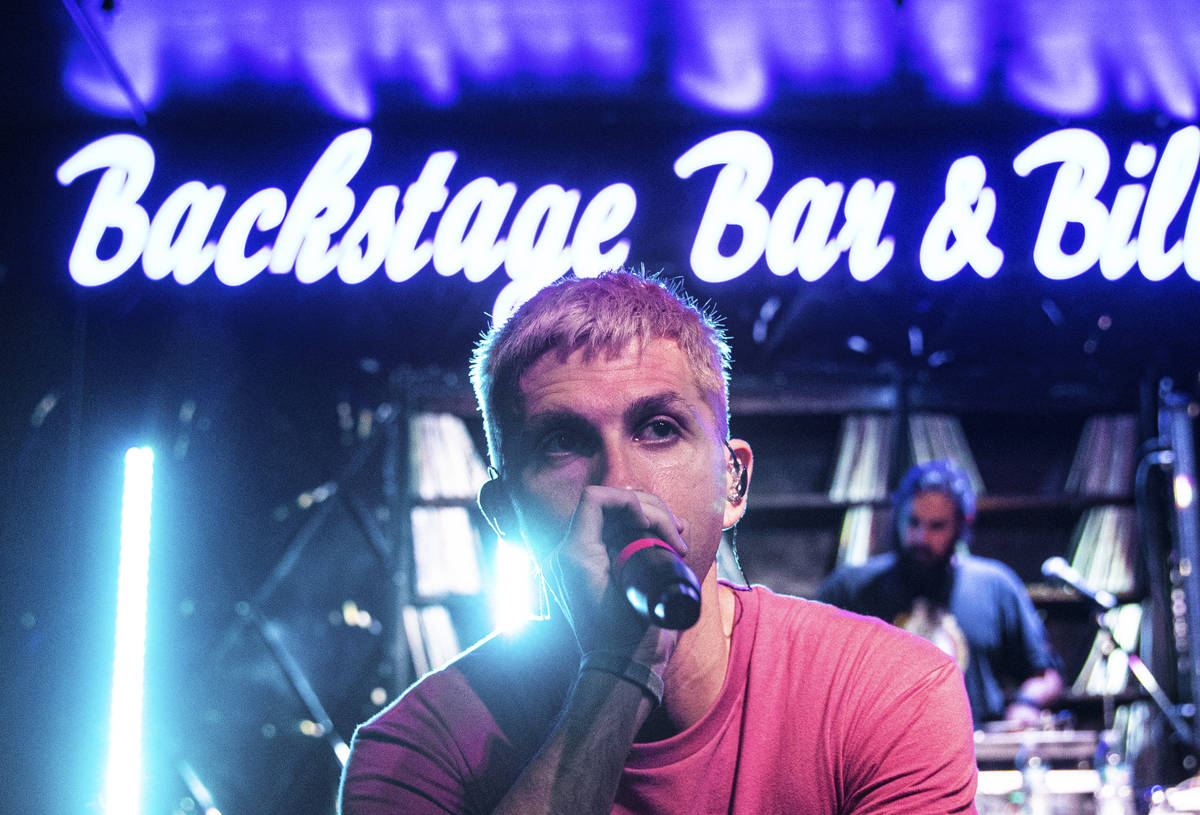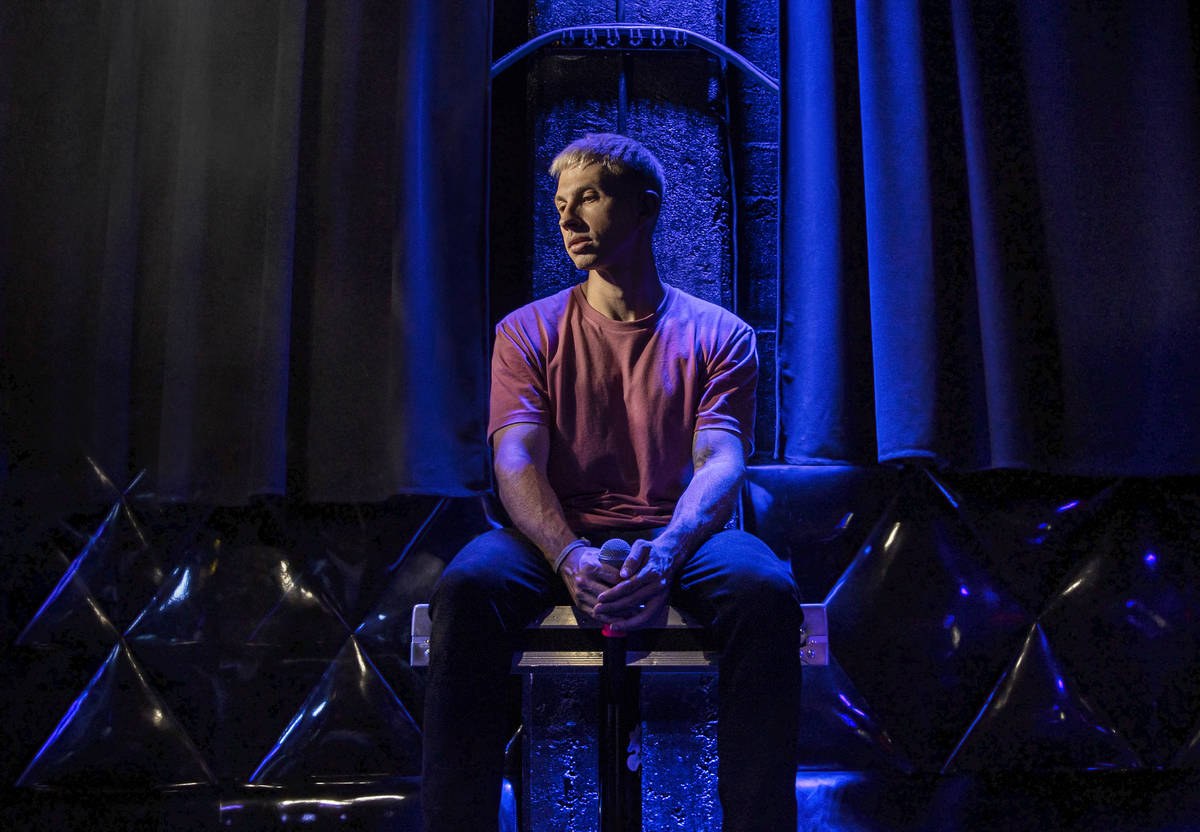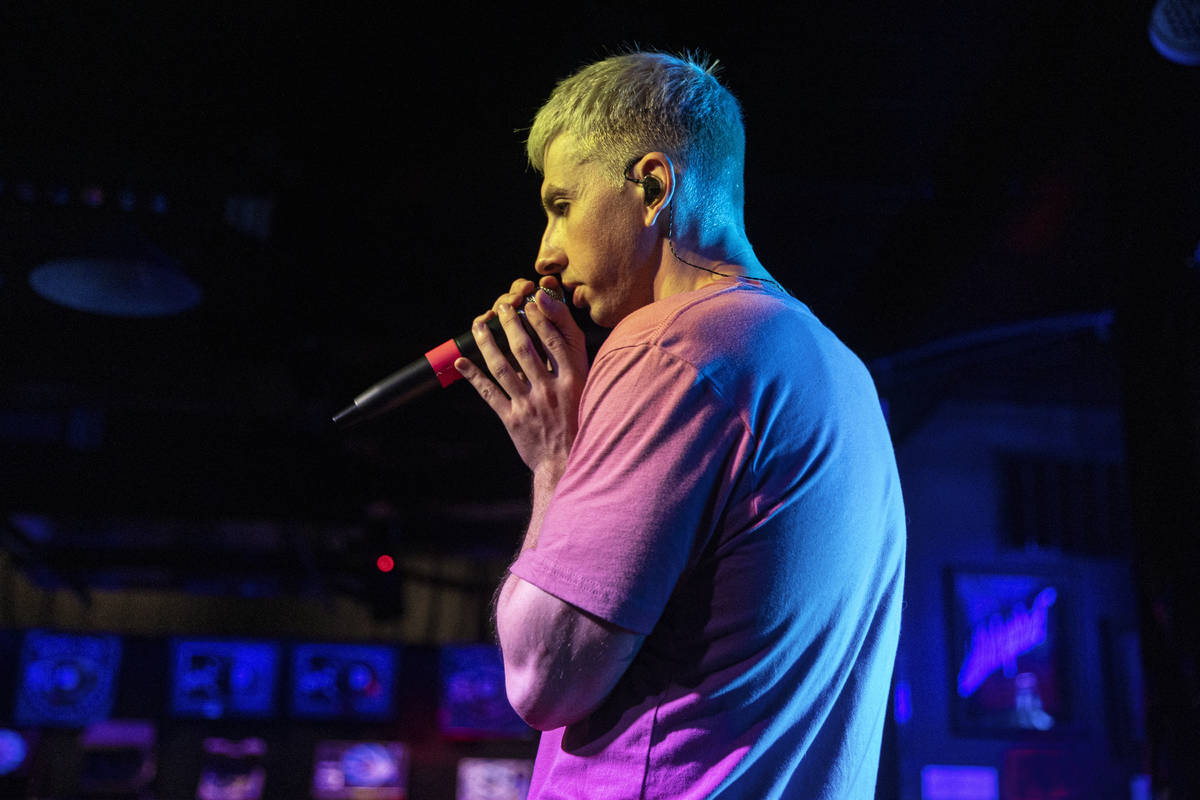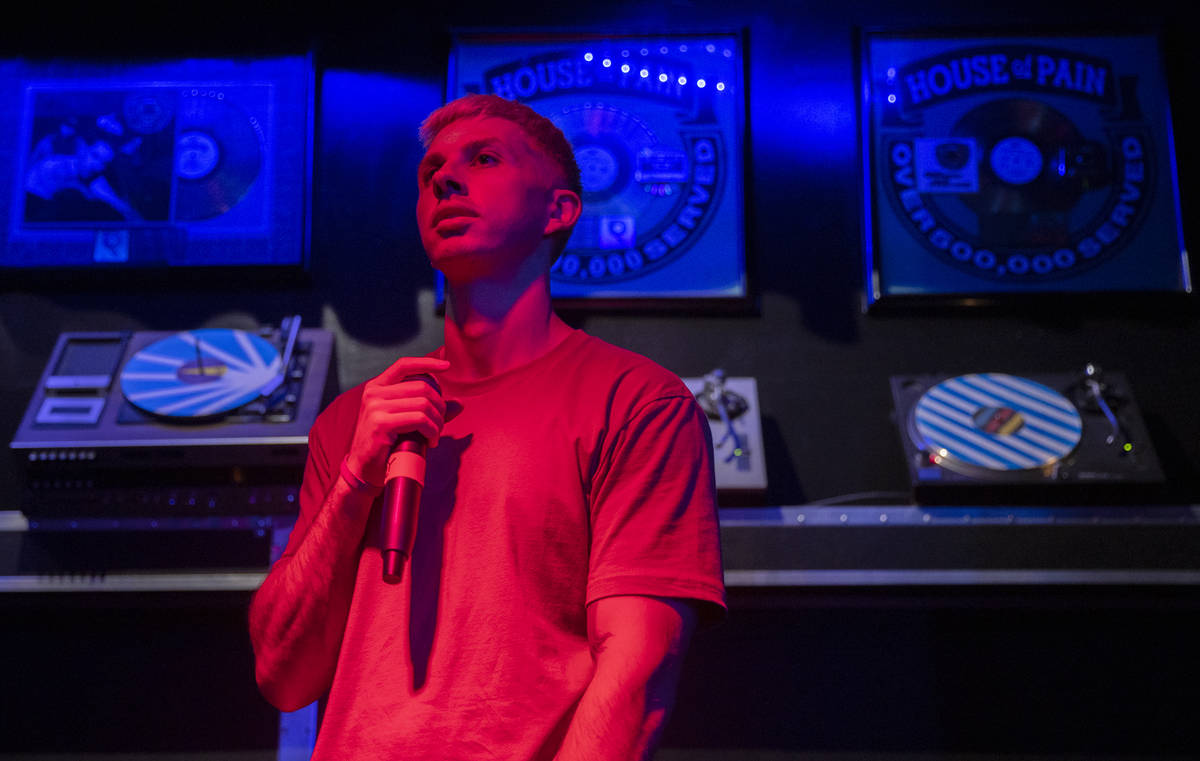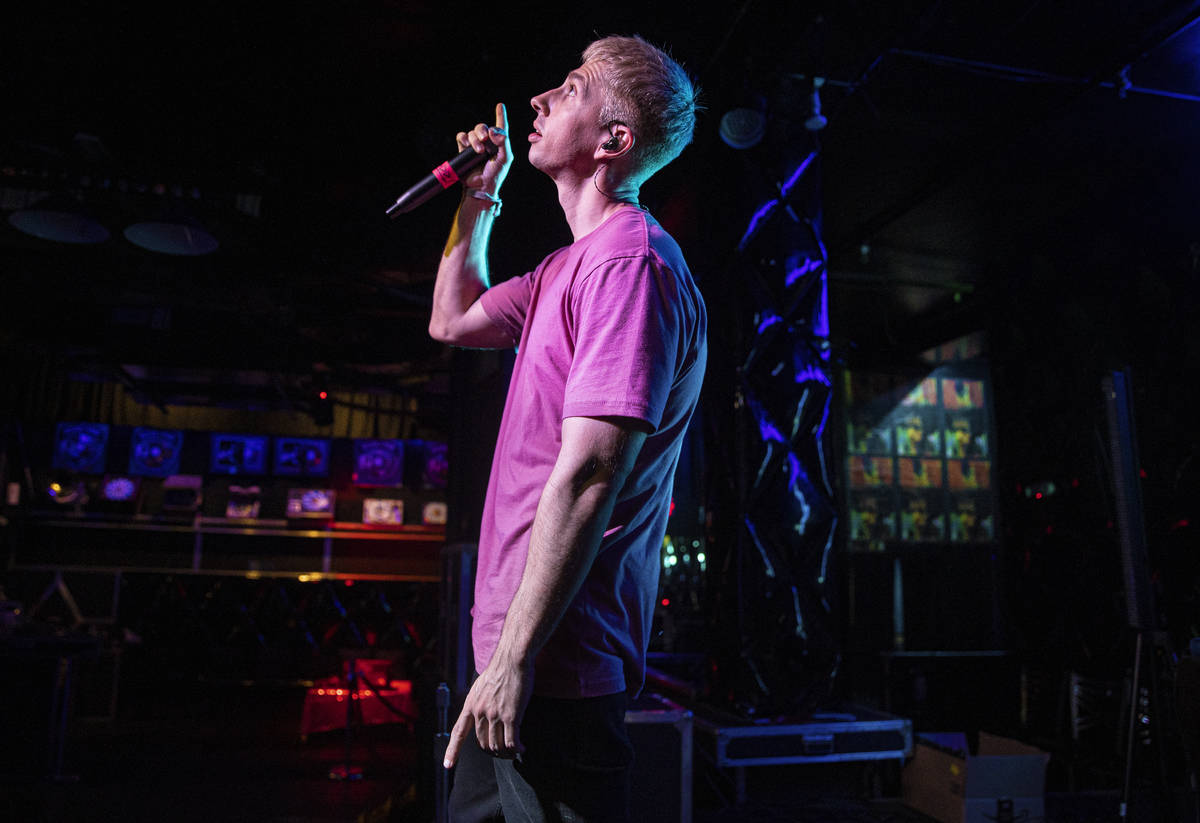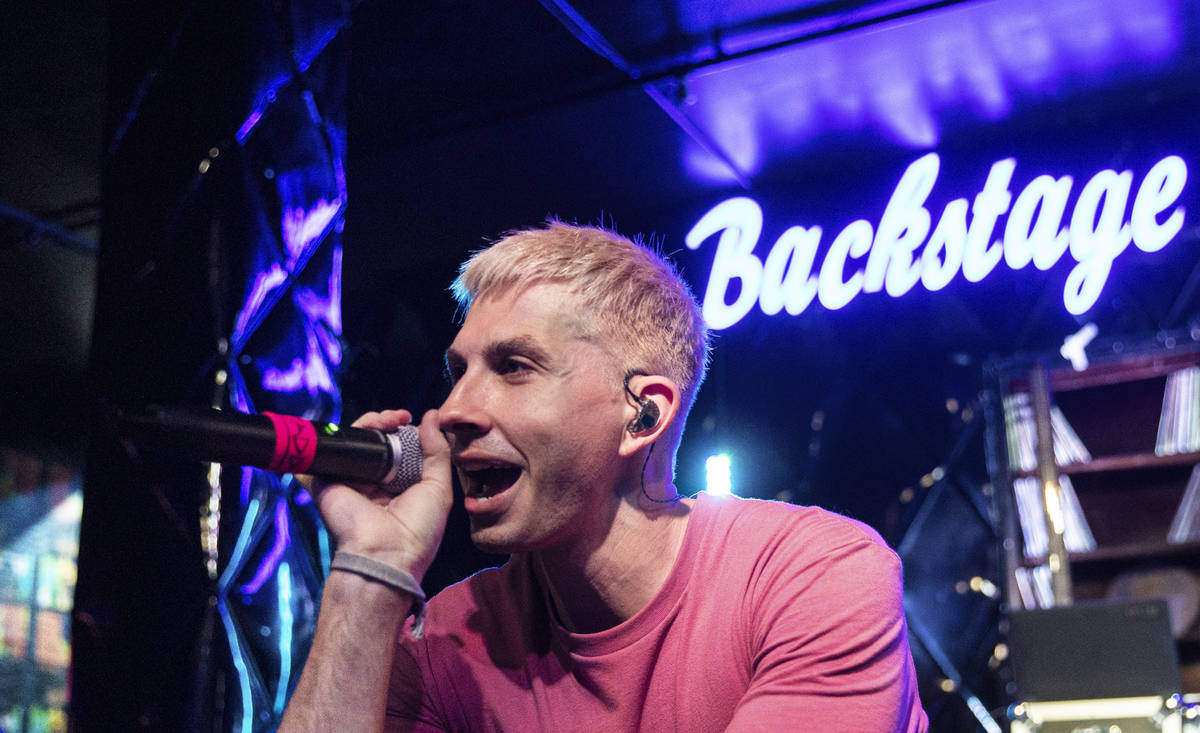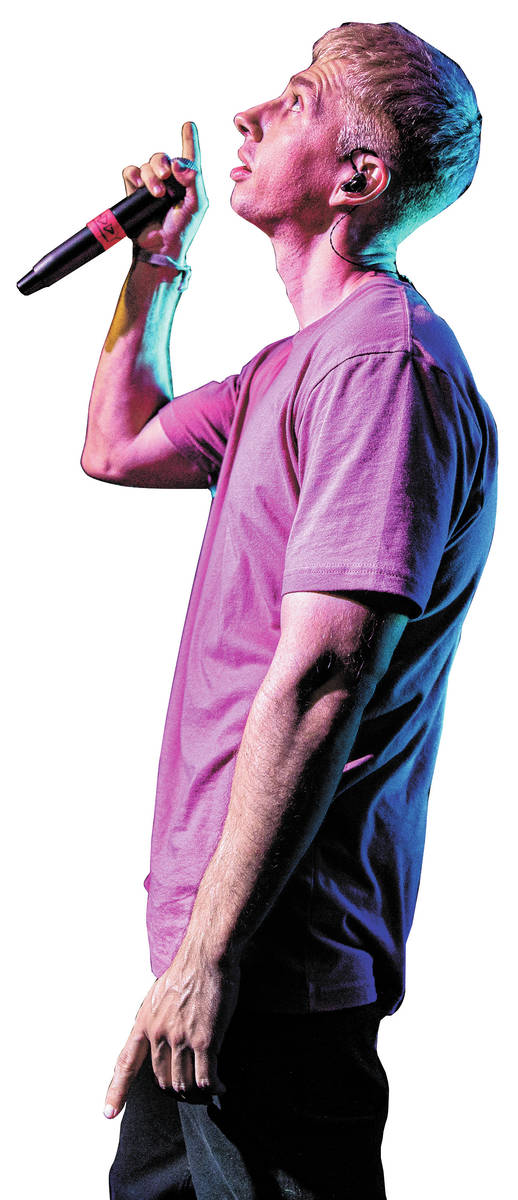Vegas rapper Ekoh rises to top of the charts, headlines new tour
His place could pass for a post office.
The packages are Jenga’d up high at Ekoh’s house, six stacks of envelopes and assorted boxes that number in the hundreds all together, towers of CDs and T-shirts and other merchandise ready to be shipped around the country.
“Another bunch of orders going out today,” the steadily ascending Vegas rapper wrote in a Facebook post last Thursday, two days after the release of his latest album, “The D3tour.” “I still remember when I couldn’t give my music away to people for free.”
How times have changed.
Last week, Ekoh’s new record debuted at No. 2 on the iTunes hip-hop charts, trailing only “Faith,” a posthumous release from the late Pop Smoke, which was the top-selling album across all genres.
It’s a rare, impressive achievement for a wholly independent artist self-releasing an album, financing it on his own, shipping CDs himself, signing each one. It tops his previous chart-high, when “The De2our” hit No. 8 last July.
Now, Ekoh (pronounced “echo”) is set to launch his first U.S. headlining tour, a 20-date outing that kicks off with a CD release show at 24 Oxford at Virgin Hotels Las Vegas on August 8 and also features an appearance at the Life is Beautiful festival in September.
Ekoh’s rise is far from an overnight success story.
“I don’t think we saw anything, really, for four years,” says producer Sean Kennedy, who’s worked with Ekoh on his last four records. “But once you start seeing it, then all of a sudden it snowballs because people are bringing other people to the party. It has a network effect.”
To wit: Since the “The De2our” dropped in July 2020, Ekoh’s Spotify following has surged from 350,000 monthly listeners to more than 800,000. It’s likely to grow further still with the release of his latest record.
“Every time we drop an album and we’re going to the post office, it’s mind-blowing,” says Ekoh, aka Jeff Thompson. “Every time I look at what the ticket sales are at, that blows my mind.
“I’ve been doing this so long to no avail that it was like, ‘Maybe it’s not going to happen,’” he continues. “And that’s fine. I’ll keep making songs here and there. I’m still going to enjoy it. But now it’s, like, actually there — not all the way there, but I can do this. It’s surreal a lot of the time. I feel like I’m talking about somebody else’s career.”
Three’s a charm
What’s bigger? The sense of anticipation hanging in the air or the canine lounging on the floor?
Thompson’s sitting on a leopard-print couch in the control room of Skeleton Key Recordings, where producer Bobby Ferrari’s plus-sized pooch prowls about in pursuit of pets. Thompson has been rehearsing here for his upcoming tour and is visibly stoked/antsy about hitting the road for the first time since 2019.
“I’m definitely nervous, because I don’t know what’s going to happen,” he says, clad in a white T-shirt and black “Indie” ball cap, “but the sales are doing really well, so that’s cool. It’s just nerve-wracking.”
The same could be said of much of the past year for Thompson, when the pandemic ended up pushing him into overdrive.
“Quarantine kind of changed everything,” he acknowledges. “It scared me, which is why I worked so hard, because I knew everybody else was home, and I knew everybody else was making content.
“It just kind of put a fire under me to put out as much stuff as I could, do as much as I could,” he continues. “I honestly pushed myself to the brink of where I mentally and emotionally could push myself, realizing that if I want it, I have to get it now.”
The end result of those efforts is the 21-song “The D3tour,” Thompson’s fifth full-length.
“We made it to ‘The D3tour,’ I’mma do something different,’” he announces over swelling violins at the outset of the album-opening title cut. And then he does just that: singing the song’s lilting hook. It sets the tone for Thompson’s most melodically refined effort yet.
Thompson’s sung on his albums before, but not to this extent: He sings a full verse on the Drake-esque “Dream Eater,” which borrows from Hall & Oates’ “Man Eater,” and the entirety of album-closing acoustic ballad “i’m not alright.”
It all adds a new dimension to the mix of bravado and vulnerability at the heart of Thompson’s discography.
“It was a natural thing of comfort, working together every day, messing around, ‘Just try to sing this,’” explains engineer Curtis Martin, who’s recorded with Thompson since 2018 and who produces his vocals. “And then he did, and it was like, ‘That was pretty good. Let’s keep doing that.’ That’s kind of how that started, really, and now he has a lot of melodic songs.”
Thompson’s a formidable presence on the mic — cue up “Smithereens,” where he delivers bars fast enough to cause wind burn — but perhaps his greatest technique is knowing when to the lay off the technique. Unlike some other artists with such a well-honed skill set, Thompson consistently puts the song first, largely avoiding the urge to peacock.
“I think the best showcase of talent is restraint, because it’s so hard in music,” he says. “People talk a lot of (crap) about pop songs because they’re simple — simple is the hardest thing in music. It’s that restraint. The most impactful things are the most simple things. Can you get a message across simply?”
One of the most successful singles on the album thus far is Thompson’s remix of rap-rock one-hit-wonders Crazy Town’s 2000 smash “Butterfly,” a song that has since become as ubiquitous in gentleman’s clubs as stripper poles. In 2004, it came in at No. 34 on VH1’s “Most Awesomely Bad Songs Ever” countdown.
“It’s one of those guilty pleasure songs that people don’t like to say that they like, but everyone likes that song. It hits,” Thompson contends. “And so I’m like, ‘If you could make a new version of this that people didn’t feel guilty listening to you, then you kind of crack a code, somehow.’”
Since being released two months ago, the song has already earned nearly 1.4 million streams on Spotify alone. Code = cracked.
‘Thinking like a label’
He no longer sweats the rent.
“For the first time in my life I ain’t worried at the sight of these bills,” Thompson raps on “Locked In,” which features fellow nimble-tongued indie MC Rittz, the video for which has been viewed over 650,000 times on YouTube. The song underscores how Thompson’s life has begun to change in the past 12 months since the release of “The De2tour,” his first significant commercial breakthrough.
“It’s weird,” Thompson reflects, “because it’s only been a year, but it feels like there’s been a big difference between the two records, just the amount of merch we sold, the amount of CDs we sold, interaction online — the amount of streams has been way, way, way more than it was.
“I’m not like a massive artist by any stretch of the imagination,” he adds, “but I’m doing OK in the lane that I built, which is sustainable for myself.”
When we first interviewed Thompson upon the release of his 2013 debut, “Zzyzx Road,” he was working three jobs to make ends meet. Now, he makes his living solely through his music. He builds new fans the old-fashioned way: constant hustle. On his Facebook page, he gets hundreds of replies from fans to every post and responds to almost all of them, forging a personal connection with much of his following.
“Instead of acquiring streams, which is what most people want, the way he’s chosen to market is to acquire new fans,” Kennedy notes. “Streams don’t build a community.
“Streams are part of it,” he says, “but if your main focus is just getting more listens, you’re going to do different things than if you’re trying to acquire a fan. He’s acquired fans as opposed to maybe trying to play the industry game, where it’s like, ‘Oh, maybe if I get on this playlist…’ No, it’s, ‘Let’s take all that and put it into going direct to someone.’ I think he’s thinking like a label; I don’t think he’s thinking like an artist.”
Thompson also relentlessly releases new music — often accompanied by well-produced, professionally shot videos — having already dropped nearly a dozen singles this year.
“It’s getting crazier and crazier,” Martin says of his workload with Thompson. “I remember it used to be, like, we’d cut an idea here and there — maybe once or twice a week — and I swear it feels like we work every single day, like, nonstop.”
Thompson says that he continues to write daily.
“I try and find out new ways to make content,” he explains. “Lifestyle-wise, I don’t have a regular job, but I have less time. When you’re working for yourself, there’s no real hours.”
There’s also no one that he has to answer to. This is perhaps the greatest benefit to remaining a wholly independent artist — if you can pull it off. The upside of not being embraced by the music industry? You remain free of its grip.
“It gives you a lot more power in the sense of realizing that you don’t need anybody,” Thompson explains. “I don’t need a Spotify playlist.
“There’s artists who depend on those for their livelihood, and if somebody doesn’t say ‘yes,’ then you’re (screwed),’” he continues. “I don’t need anybody to say ‘yes.’ I’m just grateful that I can play music.”
Contact Jason Bracelin at jbracelin@reviewjournal.com or 702-383-0476. Follow @JasonBracelin on Twitter and @jbracelin76 on Instagram



